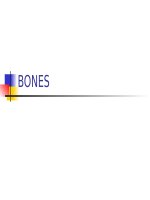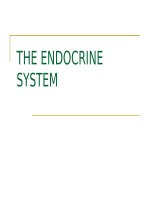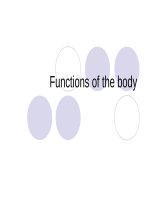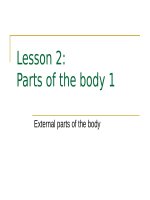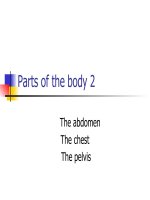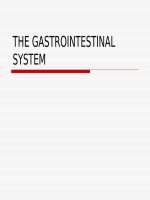THE GASTROINTESTINAL SYSTEM ppt _ ANH VĂN (y dược)
Bạn đang xem bản rút gọn của tài liệu. Xem và tải ngay bản đầy đủ của tài liệu tại đây (565.05 KB, 17 trang )
THE GASTROINTESTINAL
SYSTEM
The gastrointestinal system
What Is the Gastrointestinal
System?
The gastrointestinal system
The gastrointestinal system is
essentially a long tube running
right through the body, with
specialised sections that are
capable of digesting material put
in at the top end and extracting
any useful components from it,
then expelling the waste
products at the bottom end.
The gastrointestinal (GI) system
(the digestive system)
Consist of organs and
components.
work together intricately to break
food down into sugars, amino
acids, fatty acids, and other
simple molecules that are
absorbed into the bloodstream.
Organs of gastrointestinal system
How Does the Digestive System
Work? (1)
Food enters through the mouth
and is broken down by saliva and
the act of chewing. It passes
through the esophagus until it
reaches the stomach.
(2)
The stomach uses acids and
enzymes to convert food into a
semi-liquid state called chyme.
The stomach then expels the
chyme into the small intestine.
(3)
The small intestine is the portal
for all nutrients to enter into the
bloodstream. Crucial digestive
enzymes and hormones secreted
from the pancreas, liver, and
gallbladder break down the semiliquid chyme into molecules small
enough to be absorbed into the
bloodstream.
(4)
Any leftover food goes into the
large intestine, where it is
converted into solid waste with
the help of bacteria. Water and
salts are extracted from any
undigested food. The endproduct is expelled through the
rectum and anus.
What Causes an Unhealthy
Digestive System?
Poor diet –deficient in essential
nutrients affects the digestive
system’s ability to function
effectively and can lead to many
chronic conditions.
Overuse of antibiotics –
Antibiotics kill the “good”
bacteria and the “bad” bacteria,
leading to an imbalance in
intestinal flora. If the “good”
bacteria (probiotics) are not
replenished, the result is a poorly
functioning digestive system
overwhelmed by “bad” bacteria.
Chronic infections resulting from
various organisms, bacteria,
fungi, and viruses – An
overgrowth of bacteria (such as H.
pylori) or fungi (such as Candida
yeast) can aggravate chronic
conditions and contribute to
malabsorption of vital vitamins,
minerals, and amino acids.
Food intolerances – Lactose and
gluten intolerance can irritate the
digestive system.
Stress – Chronic stress and
negative thinking can literally
“upset” the digestive system.
Over time, stress can cause
serious damage to the digestive
system, in the form of ulcers and
hypochlorhydria.
Heavy metal toxicity – Heavy
metals such as mercury cannot
be easily processed by the
digestive system.
Lack of proper digestive enzymes
– Without the right combination
of digestive enzymes, food can’t
be broken down efficiently, which
leads to vitamin, mineral, and
amino acid deficiencies.
Low hydrochloric acid (HCl) – A
low output of HCl (aka
hypochlorhydria) leads to
bacterial and yeast overgrowth,
which aggravates many chronic
conditions.
